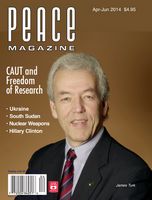
Peace Magazine Apr-Jun 2014, page 22. Some rights reserved.
Search for other articles by Ed Silva here
Where else in the world can such a thing happen?
March 11, 2014 was the third anniversary of the Fukushima nuclear disaster, one potentially more disastrous than either the ones at Three Mile Island in America or the Chernobyl accident in the USSR. It was the result of an earthquake and tsunami that left 19,000 people dead or missing.
The earthquake in the Pacific sent massive waves toward the Daiichi nuclear energy facility on the northeastern coast of Japan. Four of six reactors were disabled; three melted down, while an explosion occurred at the fourth. This released tonnes of radioactive materials into the air and water.
Since then, in an effort to reduce radiation illnesses, over 300,000 people have become domestic refugees, many evacuated from their homes and livelihoods, often without much of their household and personal goods.
Consider the situation explored in the documentary film Nuclear Nation: the Fukushima Refugees’ Story. It traces some of the 7,000 people of Futaba, a town hosting some of the reactors and now judged uninhabitable. In this film, former mayor Katsutaka Idogawa, who had enthusiastically supported atomic power development, encouraging its proliferation in his hometown and throughout his country, now is a vocal anti-nuclear critic. He feels betrayed by the power plants’ owners and the central government, both of which stressed the safety of nuclear power production.
In the three years since the meltdown, the former mayor has become a leader in the anti-nuclear power movement. The movement opposes the industry’s and the central government’s plans to increase Japan’s dependence on nuclear power from 30% to 50% by 2030. This plan is opposed by many—for instance, weekly protesters at the prime minister’s official residence—as well as the few, including one ex-prime minister, Naoto Kan, on whose watch the disaster occurred.
Professor Koichi Nakano, director of Sophia University’s Institute of Global Concern, suggests that the Fukushima disaster has given rise to a “climate of anxiety and insecurity.” This atmosphere facilitates a conservative authoritarianism, indexed by a rise in militarism, censorship, and official secrecy.
Journalists Lucy Birmingham and David McNeill, coauthors of Strong in the Rain: Surviving Japan’s Earthquake, Tsunami and Fukushima’s Nuclear Disaster, note that virtually all nuclear projects were halted after the initial event. But, over the next few years, industry and government have increasingly pushed to expand such projects. For example, in December 2012, the recently elected Liberal Democratic Party reversed anti-nuclear campaign promises by offering new supports for the nuclear power industry.
Birmingham and McNeill also note that the Fukushima disaster is an ongoing crisis of unknowable proportions. Thus, the three melted down reactors require continuous cooling by vast amounts of flowing water. Loss of this water flow for any reason would be catastrophic, poisoning the air, land, and sea. Yet the flowing water necessarily poisons the oceans and the sea floor everywhere. Further, the fourth reactor houses radioactive spent fuel rods. Their removal and decontamination remains a serious engineering problem, as does the decontamination of the entire Fukushima power production plant site.
Nonetheless, there is some hope in the fact that Japanese citizens themselves do not support the proposed expansion of nuclear power. Thus, a reasonable test of the democracy of the anti-nuclear movement is to convince the citizenry and the current political economic elites that another world is possible, one without unsustainable atomic power.
One tiny illustration of this ongoing struggle is Asami Akihiro. A former Tokyo salaryman, he had moved with his family into the Fukushima area to grow organic food. After the 2011 disaster, he ran as an independent mayoralty candidate rallying people toward a more sustainable future. His essentially educational campaign suggests a way forward, and is documented in a forthcoming film, Uncanny Terrain.
Edward Silva is a retired sociology professor, University of Toronto.

Peace Magazine Apr-Jun 2014, page 22. Some rights reserved.
Search for other articles by Ed Silva here